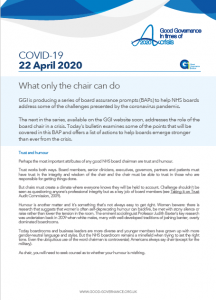What only the chair can do
22 April 2020

GGI is producing a series of board assurance prompts (BAPs) to help NHS boards address some of the challenges presented by the coronavirus pandemic.
The next in the series, available on the GGI website soon, addresses the role of the board chair in a crisis. Today’s bulletin examines some of the points that will be covered in this BAP and offers a list of actions to help boards emerge stronger than ever from the crisis.
Trust and humour
Perhaps the most important attributes of any good NHS board chairman are trust and humour.
Trust works both ways. Board members, senior clinicians, executives, governors, partners and patients must have trust in the integrity and wisdom of the chair and the chair must be able to trust in those who are responsible for getting things done.
But chairs must create a climate where everyone knows they will be held to account. Challenge shouldn’t be seen as questioning anyone’s professional integrity but as a key job of board members (see Taking it on Trust Audit Commission, 2009).
Humour is another matter and it’s something that’s not always easy to get right. Women beware: there is research that suggests that women’s often self-deprecating humour can backfire, be met with stony silence or raise rather than lower the tension in the room. The eminent sociolinguist Professor Judith Baxter’s key research was undertaken back in 2009 when white males, many with well-developed traditions of joshing banter, overly dominated boardrooms.
Today boardrooms and business leaders are more diverse and younger members have grown up with more gender-neutral language and styles. But the NHS boardroom remains a minefield when trying to set the right tone. Even the ubiquitous use of the word chairman is controversial; Americans always say chair (except for the military).
As chair, you will need to seek counsel as to whether your humour is misfiring.
Strategic forward view
The chair has an important role in keeping their board’s focus on the future and on clarifying what services and patient experience should look like in three, five and ten years’ time. This has never been truer than now with so much management and clinical attention on the here-and-now.
The world has changed; we are needing to respond at pace without much time to assess the long-term consequences of action. No doubt there will be extensive reviews after we return to something like normal but, for now, chairs should ensure that they log the things we feel need to change forever. These post-it points will form the new strategic agenda for service delivery, patient and staff safety, logistics and collaborative efforts.
Why would we go back to busy waiting rooms if 30% of consultations can be handled remotely? Why would we plough through five-hour board meetings when we have shown that we can streamline key decision-taking to 90 minutes?
Why would we want traffic-polluted hospital skies with acres of car parks when the coronavirus has given us empty avenues?
Collaboration, respect for staff and celebration of public service values have become the norm. The language is changing from challenge to a more positive testing of ideas.
The decision to write off the huge NHS deficit in England is welcome but it’s always a mistake to think the underlying overspend will just go away. This needs action now to bring finances back under control especially if the local NHS ends up paying for much of those extra staff, kit, tests etc.
Of course everyone is supremely busy but every crisis is an opportunity too. It’s the collective responsibility of boards – and their chairs in particular – to ensure that the innovations of today are not wasted by simply returning to yesterday after the crisis.
Call to action
1. Look after yourself and your board and top executive team.
2. Create a diary of events, decisions and accolades for the inevitable inquisition that will follow. Remember the catchphrase ‘scrutiny to improve; challenge to test’. Ask the board secretary to collate all relevant documents and decisions.
3. Add ‘respect for staff’’ to the board’s principles for public life.
4. Recognise that some staff and board members will want to retire/leave; support them but offer exit interviews to learn.
5. Introduce succession planning and induction for new types of board members – both exec and non-exec.
6. Think about the cumulative impact of multiple risks: the risk of risks.
7. Check that normal priorities are not being ignored because of the crisis. Is business as usual still operating? Invite IA to run an assurance-mapping exercise.
The Good Governance Institute is keeping a daily record of how the situation develops for NHS and other public or third sector boards and we publish advice daily.
We are keen to hear your views. If this briefing prompts any questions or comments, please call us on 07732 681120 or email us at advice@good-governance.org.uk. We will aim to respond within 24 hours.

